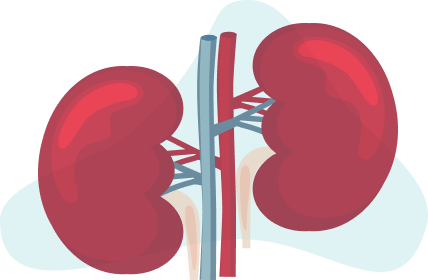For some people, kidney cancer (RCC) can come back and spread.
Even after surgery.
Even if the kidney is removed.
Learn more about the potential risk of kidney cancer (RCC) returning after surgery—and what you can do to help reduce it if you are at higher risk

It’s true. Certain people may be at a higher risk of their kidney cancer (RCC) coming back after surgery. While the goal of surgery is to remove all of the cancer, sometimes cancer cells can remain in the body. But for those at a higher risk of their cancer coming back, there are other options in addition to watching and waiting that can help lower the risk of RCC returning or spreading after surgery.
Unsure if you’re at a higher risk for kidney cancer (RCC) coming back after surgery? Talk to your doctor to learn more about your risk level.
When kidney cancer comes back after surgery, it’s called recurrence
There are different types of cancer recurrence:
- In local/regional recurrence, the cancer comes back in or around the area where it first occurred.
- In distant recurrence, the cancer spreads to other places or organs in the body.
How common is it for kidney cancer to come back after surgery?
To learn how common recurrence is for some people with kidney cancer (RCC), researchers looked at data from 643 people aged 66 and older who were at a higher risk of their cancer coming back or spreading after surgery.
The researchers found that:
This information is not representative of outcomes for all people.
The conversation around “risk” starts with your pathology report
A pathology report is a medical report about a piece of tissue, blood, or organ that has been removed from your body.
It is usually available shortly after receiving surgery.
Your doctor uses this information to help measure your risk for cancer returning after surgery and develop any treatment plans to address your risk.
Continue reading below to learn more about the risk of RCC coming back after surgery.
What should I know about my risk of RCC coming back after surgery?

After surgery for kidney cancer (RCC), your doctor will receive a pathology report that provides more detailed information about your cancer. This information is used to help determine your risk for cancer returning after surgery.
For kidney cancer, most doctors use a scale called the “TNM System” to determine the stage of cancer. It uses letters T, N, and M to describe different areas of cancer growth. Based on your imaging tests and pathology report, your oncologist will assign a score or number with each letter.
Tumor
T1, T2, T3, and T4 refer to the size and invasiveness of the primary tumor.
The higher the number after the T, the larger the tumor and/or the more it has grown into nearby tissues.
Tumors T3 and above may mean a higher risk of kidney cancer (RCC) coming back.
Lymph node involvement
N0 and N1 refer to the presence or absence of cancer in nearby lymph nodes.
NX means that the presence or absence of cancer in nearby lymph nodes could not be determined.
N1 means the cancer has spread to the lymph nodes.
Metastasis
M0 means the cancer hasn’t spread to another part of the body.
MX means the metastasis could not be determined.
M1 means the cancer has spread to other parts of the body.
Another factor your doctor uses to help determine risk is cancer grade:
Grade 1, 2, 3, and 4 refer to how normal or abnormal cancer cells look under a microscope. The more normal they appear, the lower their grade number.
The higher the grade, the more likely the cancer could return or spread.
Talk to your oncologist to help determine your next steps, including whether treatment after surgery is right for you.

Your care team is made up of different health care providers who each play a big role at different times throughout your treatment. These experts can aid you along your journey, answer questions, and offer guidance regarding your best path forward.
Your care team may include:
Urologist
Doctor with special surgical training in urinary organs. This is the doctor who operated on your kidney cancer and may determine your risk level for kidney cancer (RCC) coming back or spreading after surgery.
Oncologist
Specialist in cancer and cancer treatment. Along with your surgeon, an oncologist will help develop the right treatment plan for you, including whether treatment after surgery is necessary.
Oncology Nurses
Registered nurses with advanced training. These specialists work with patients who have cancer. They can also help answer any questions you may have around treatment.
Talking to your care team about your risk
After surgery, if your pathology report shows you may be at a higher risk of kidney cancer coming back, there may still be options available to you.
Talk to your care team about your risk when reviewing your pathology report to help determine your next steps, including whether treatment after surgery is right for you.
If you have not been referred to an oncologist after surgery, ask your urologist if a referral is right for you.
Are there treatment options available for those who are at higher risk of kidney cancer (RCC) coming back after surgery?
During surgery, your doctor will remove your kidney tumor and any nearby tissues where the cancer may have spread. The goal of surgery is to remove the tumor and any secondary tumor lesions, but some cancer cells may remain in your body, and for some patients, the risk of cancer returning may be higher. Adjuvant therapy may be appropriate if you are at higher risk of your cancer returning.
“Adjuvant therapy” is additional treatment given after surgery to treat any cancer cells that may remain in the body
Remember: Just because your kidney was removed doesn’t mean the kidney cancer can’t return after surgery.
Ask your doctor these questions:
- What are the results of my pathology report?
- What is the risk of my cancer coming back after surgery?
- If I am at an increased risk of my cancer coming back, what are my potential treatment options after surgery to help lower that risk?
- Should I speak with an oncologist as my next step after surgery?
Talk to your doctor to understand your risk and determine which treatment option is right for you.

Visit these organizations and resources for more information about kidney cancer*
Kidney Cancer Research Alliance (KCCure) | kccure.org
The Kidney Cancer Research Alliance (KCCure) is a grassroots organization of patients, caregivers, doctors, and medical researchers dedicated to curing kidney cancer through increased funding that accelerates research.
Kidney Cancer Coalition (KidneyCAN) | kidneycan.org
KidneyCAN is a patient-created and patient-driven movement, drawing energy and motivation from people all over the United States and the world whose lives are impacted by kidney cancer.
American Cancer Society | cancer.org
The American Cancer Society is the leading cancer-fighting organization with a vision of ending cancer as we know it, for everyone.
*The organizations listed above are not affiliated with Merck. Merck does not review or control their content. The list does not constitute endorsement by Merck.